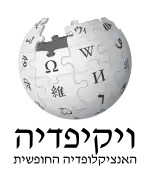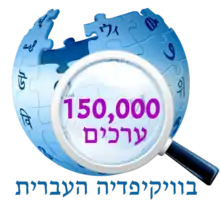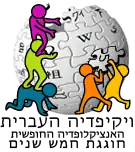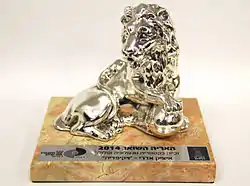Hebrew Wikipedia
Hebrew Wikipedia (Hebrew: ויקיפדיה העברית, IPA: [vikiˈpedja ha(ʔ)entsikloˈpedja haχofˈʃit]) is the Hebrew language edition of Wikipedia. This edition was started on 11 May 2001[1] and contains more than 288,000 articles as of February 2021.
 | |
 Main Page of the Hebrew Wikipedia in 2010 | |
Type of site | Internet encyclopedia project |
|---|---|
| Available in | Hebrew |
| Owner | Wikimedia Foundation |
| URL | he.wikipedia.org |
| Commercial | No |
| Registration | Optional |
History

Timeline
- July 8, 2003: The Hebrew edition of Wikipedia was launched.
- October 25, 2003: The 1,000th article was written.
- July 22, 2004: The first meeting of Hebrew Wikipedians took place in Tel Aviv, Israel.
- September 10, 2004: The 10,000th article was written.
- September 20, 2004: The Hebrew version of the Flag of Kazakhstan article became the one millionth article created in all Wikipedias.
- December 24, 2006: The 50,000th article was written.
- January 10, 2010: The 100,000th article was written.
- August 29, 2013: The 150,000th article was written.
- December 28, 2016: The 200,000th article was written.

Hebrew Wikipedia features several organized article writing projects, among them Wikitort - an academic project to write original articles about tort law,[2] PhysiWiki - a project to write and improve articles about Physics with the cooperation of Weizmann Institute of Science,[3] and ongoing academic projects.[4] Another major topic is Jewish history and the History of Israel. In 2006, the Elef Millim project[5] (English: Thousand Words/Thousand Miles project) was launched to provide Wikipedia with free images. Groups of Wikipedians meet for field trips around the country to take pictures of Israeli sites.
Hebrew spelling is a matter of debate. Since the standards published by the Academy of the Hebrew Language are not always meticulously followed in common usage, the Hebrew Wikipedia community decides on problematic cases of spelling through discussion and polls to ensure consistency. When technically possible, spelling decisions are periodically enforced using automatic replacement by a bot.[6]
Hebrew Wikipedia's requirements for notability standards are relatively strict.
Hebrew Wikipedia organizes yearly competitions, sometimes with the assistance of the Wikimedia foundation, as well as social gatherings and picnics.
2010 Knesset meeting

On the occasion of the 100,000 articles milestone, the Science and Technology Committee of the Knesset (Israeli parliament) invited Wikipedia contributors and users to the 2 February 2010 morning meeting, to join in a debate about Wikipedia and other open-source resources. Some Wikipedia contributors at the meeting criticized "the lack of government cooperation with their efforts to compile a free online Hebrew-language encyclopedia," as well as sharing complaints from Wikipedia editors abroad that since the Israel Defense Forces does not release photos for free redistribution on the Internet, the sole source of available pictures for entries such as the Gaza War and the 2006 Lebanon War are the Palestinians.[7]
Comparison with other language editions
In July 2006, Hebrew Wikipedia had one of the highest number of bytes per article, and the highest of all editions on Wikipedia with over 20,000 articles.[8]
Whereas the English Wikipedia requires a general consensus for deleting articles (hence deletion discussion is not considered to be a voting process), the Hebrew Wikipedia has adopted a policy of deletion upon a 55% majority, with no minimum number of votes.[9] In these votes, only registered users with one month seniority and at least 100 edits in the article, image, category or template namespaces in the past 90 days can vote.
As of December 2020, with more than 30,000,000 edits and 3,200 active users, Hebrew Wikipedia had an abnormally high amount of edits and active users (in comparation with its 284,400 articles on various topics at the time and the number of Hebrew speakers in the world), in comparation with other Wikipedias with similar number of articles.[10] The number of active users grows in a steady pace year to year. The average number of articles per day is also significantly higher. It has an article depth of 258.
Strict inclusion criteria
Compared to English Wikipedia, Hebrew Wikipedia is more conservative with respect to content.[11]
The inclusion criteria are detailed under the "principles and guidelines" page.[12] Some examples:
- Articles on porn movies will be deleted unless they became cultural symbols.[13]
- Articles on porn stars will be deleted unless they have other notable aspects in their lives.
- A book has to meet one of these four criteria: published by a known publisher, sold 10,000 copies, won a prize, or received good reviews.[14]
- Writers have to write at least two books to be notable as writers.[15]
- Singers and bands must have an album to their credit.[16]
- Articles on student films are deleted unless they win first prize in a film festival or were screened in mainstream cinemas.[17]
List articles are rare. In particular, lists of TV series episodes are not accepted, even as part of the articles on the series.
Other controversial topics are articles of about small schools and minor educational institutions.[18]
Hamichlol
Hamichlol (Hebrew: המכלול "The Entirety") is a mirror of the Hebrew Wikipedia. It contains articles copied from the Hebrew Wikipedia which are edited to be acceptable to Orthodox Jewish readers.
Statistics
| Number of user accounts | Number of articles | Number of files | Number of active users | Number of administrators |
|---|---|---|---|---|
| 759564 | 287832 | 67553 | 3742 | 36 |
See also
References
- "Wikipedia-l new language wikis".
- he:ויקיפדיה:פרויקט WIKITORT
- he:ויקיפדיה:מיזמי ויקיפדיה/פיזיוויקי
- he:ויקיפדיה:עבודות ויקידמיות
- meta:Elef Millim project
- Shai, David (21 April 2019). "Wikipedia's good bots fixing Hebrew language entries". ynetnews. Retrieved 24 October 2019.
- Rebecca Anna Stoil (2 February 2010). "Is Wikipedia good for the Jews?". Jerusalem Post.
- Wikimedia Statistics Tool
- Hebrew Wikipedia deletion policy page
- List of Wikipedias - Meta
- he:ויקיפדיה:מה ויקיפדיה איננה
- he:ויקיפדיה:עקרונות וקווים מנחים
- he:ויקיפדיה:עקרונות וקווים מנחים ליצירת ערכים/פורנוגרפיה
- he:ויקיפדיה:עקרונות וקווים מנחים ליצירת ערכים/ספרים
- he:ויקיפדיה:עקרונות וקווים מנחים ליצירת ערכי אישים
- he:ויקיפדיה:עקרונות וקווים מנחים ליצירת ערכי אישים
- he:ויקיפדיה:עקרונות וקווים מנחים ליצירת ערכים/סרטי סטודנטים
- he:ויקיפדיה:גבולות/מוסדות
External links
| Hebrew edition of Wikipedia, the free encyclopedia |
- (in Hebrew) Hebrew Wikipedia
- Spiro, Amy (7 January 2019). "What did Israelis look up on Wikipedia in 2018?". The Jerusalem Post. Retrieved 24 October 2019.
- "After uploading 28,000 historical images, Wikimedia signs deal with National Library of Israel". haaretz.com. 26 February 2019. Retrieved 24 October 2019.
- "Israel-edit-a-thon at Wikipedia Germany". i24NEWS. Retrieved 24 October 2019.
- Kalman, Aaron (3 June 2013). "Wikipedians most likely to war over 'Israel,' 'God'". The Times of Israel. Retrieved 24 October 2019.
